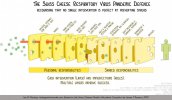Navigation
Install the app
How to install the app on iOS
Follow along with the video below to see how to install our site as a web app on your home screen.
Note: This feature may not be available in some browsers.
More options
Style variation
Guest viewing is limited
- You have a limited number of page views remaining
- 9 guest views remaining
- Register now to remove this limitation
- Already a member? Click here to login
You are using an out of date browser. It may not display this or other websites correctly.
You should upgrade or use an alternative browser.
You should upgrade or use an alternative browser.
Can touching a barbell in the gym get you sick with the coronavirus?
- Thread starter Michael Scally MD
- Start date
MisterSuperGod
New Member
What's with all the Indian know it all's flocking to Twitter? You'd think if they really knew it all, their home country wouldn't be a disease riddled shit hole.
And this:
@Michael Scally MD In your opinion, of all the NPIs, regulations and mandates issued worldwide, what method(s) have best worked to mitigate virus spread?
Coronavirus (COVID-19) Update: FDA Authorizes First COVID-19 Test for Self-Testing at Home
https://www.fda.gov/news-events/press-announcements/coronavirus-covid-19-update-fda-authorizes-first-covid-19-test-self-testing-home
A rapid at-home covid-19 test — for under $50 — just got FDA approval
https://www.washingtonpost.com/nation/2020/11/18/home-test-coronavirus-covid-fda/
People who think they were exposed to the coronavirus face a number of logistical obstacles in the United States to get tested: Many tests take days to produce results, require leaving quarantine to visit a medical professional, or — most likely — both.
That could change with Lucira Health’s “All-In-One” test kit, which on Tuesday became the first rapid, at-home test authorized by the Food and Drug Administration. https://www.fda.gov/media/143810/download
The California biotechnology company’s single-use home test kit, which it expects to sell for less than $50, requires a prescription from a doctor. As winter approaches and infections have surged in most states, the at-home test will allow people who are possibly infected to not have to go into clinics or hospitals to get tested, potentially spreading a virus that has already killed more than 247,000 people in the United States.
Unlike rapid antigen tests, which experts warn can be unreliable, the kit will test genetic material in a method similar to the laboratory tests that have become the standard for detecting the virus. After swirling the nasal specimen into a solution, home-testers plug the vial into a portable, battery-operated device, which uses a light to indicate the test result within 30 minutes. A positive test result can be generated in as few as 11 minutes.
https://www.fda.gov/news-events/press-announcements/coronavirus-covid-19-update-fda-authorizes-first-covid-19-test-self-testing-home
A rapid at-home covid-19 test — for under $50 — just got FDA approval
https://www.washingtonpost.com/nation/2020/11/18/home-test-coronavirus-covid-fda/
People who think they were exposed to the coronavirus face a number of logistical obstacles in the United States to get tested: Many tests take days to produce results, require leaving quarantine to visit a medical professional, or — most likely — both.
That could change with Lucira Health’s “All-In-One” test kit, which on Tuesday became the first rapid, at-home test authorized by the Food and Drug Administration. https://www.fda.gov/media/143810/download
The California biotechnology company’s single-use home test kit, which it expects to sell for less than $50, requires a prescription from a doctor. As winter approaches and infections have surged in most states, the at-home test will allow people who are possibly infected to not have to go into clinics or hospitals to get tested, potentially spreading a virus that has already killed more than 247,000 people in the United States.
Unlike rapid antigen tests, which experts warn can be unreliable, the kit will test genetic material in a method similar to the laboratory tests that have become the standard for detecting the virus. After swirling the nasal specimen into a solution, home-testers plug the vial into a portable, battery-operated device, which uses a light to indicate the test result within 30 minutes. A positive test result can be generated in as few as 11 minutes.
Vaccine Possibilities
Vaccine Possibilities
Now that we’re seeing that coronavirus vaccines are indeed possible (and are on their way), let’s talk about the remaining unanswered questions and the things that we will be getting more data on. Here are some of the big issues – it’ll be good to see this stuff coming into focus. I’ll put these into the form of questions (think of it as a tribute to the late Alex Trebek, whom I was glad to help remember in this article). Each one will have a summary answer at the end of the section, if you just want to skip to that part.
How long will the vaccine protection last? …
Bottom line: Taken together, this study, several others over the past few months, and this recent work all paint a consistent picture of a strong, normal, lasting immune response in the great majority of patients. Add in the results we’re seeing from the two vaccines that have reported interim data so far, and I think that the prospects for lasting immunity from vaccination are also very good. Remember, the early vaccine data suggested antibody responses at least as strong as those found in naturally infected cases. There seems (so far) every reason to think that vaccine-based immunity will be as good or better than that conferred by actual coronavirus infection. I very much look forward to more data to shore up this conclusion, but that’s how it looks to me at the moment.
How effective are these vaccines? Will they provide total protection or not? …
Bottom line: the results we have so far indicate that these vaccines will indeed provide strong protection in the great majority of patients. The number of asymptomatic cases among the vaccinated population will be a harder number to pin down, but I believe that we should be in good enough shape there as well, based on antibody levels in the primate studies and what we’re seeing in humans.
What about coronavirus mutations? Will the virus move out from under the vaccine’s targeting? …
Bottom line: the coronavirus can’t undergo the wholesale changes that we see with the influenza viruses. And the mutations we’re seeing so far appear to still be under the umbrella of the antibody protection we’ll be raising with vaccination, which argues that it’s difficult to escape it.
What about efficacy in different groups of people? Where will the vaccines work the best, and where might there be gaps? …
Bottom line: our first look at efficacy in older patients is very good indeed, and that’s the most significant high-risk patient subgroup taken care of right off the top.
How safe are these vaccines? What do we know about side effects?
Bottom line: immediate safety looks good so far. Rare side effects and long-term ones are still possible, but based on what we’ve seen with other vaccines, they do not look to be anywhere at all significant compared to the pandemic we have in front of us.
OK, what about the rollout? Who’s getting these things first? When does everyone else get a chance to line up? …
Bottom line: the very first people to get these new vaccines will almost surely be health care workers, and starting some time on in December. The rollout after that has too many variables to usefully predict, but it’s going to be the biggest thing of its type ever attempted, in people-per-unit-time. And yes, I think it’s going to work, and not a minute too soon.
Vaccine Possibilities
Now that we’re seeing that coronavirus vaccines are indeed possible (and are on their way), let’s talk about the remaining unanswered questions and the things that we will be getting more data on. Here are some of the big issues – it’ll be good to see this stuff coming into focus. I’ll put these into the form of questions (think of it as a tribute to the late Alex Trebek, whom I was glad to help remember in this article). Each one will have a summary answer at the end of the section, if you just want to skip to that part.
How long will the vaccine protection last? …
Bottom line: Taken together, this study, several others over the past few months, and this recent work all paint a consistent picture of a strong, normal, lasting immune response in the great majority of patients. Add in the results we’re seeing from the two vaccines that have reported interim data so far, and I think that the prospects for lasting immunity from vaccination are also very good. Remember, the early vaccine data suggested antibody responses at least as strong as those found in naturally infected cases. There seems (so far) every reason to think that vaccine-based immunity will be as good or better than that conferred by actual coronavirus infection. I very much look forward to more data to shore up this conclusion, but that’s how it looks to me at the moment.
How effective are these vaccines? Will they provide total protection or not? …
Bottom line: the results we have so far indicate that these vaccines will indeed provide strong protection in the great majority of patients. The number of asymptomatic cases among the vaccinated population will be a harder number to pin down, but I believe that we should be in good enough shape there as well, based on antibody levels in the primate studies and what we’re seeing in humans.
What about coronavirus mutations? Will the virus move out from under the vaccine’s targeting? …
Bottom line: the coronavirus can’t undergo the wholesale changes that we see with the influenza viruses. And the mutations we’re seeing so far appear to still be under the umbrella of the antibody protection we’ll be raising with vaccination, which argues that it’s difficult to escape it.
What about efficacy in different groups of people? Where will the vaccines work the best, and where might there be gaps? …
Bottom line: our first look at efficacy in older patients is very good indeed, and that’s the most significant high-risk patient subgroup taken care of right off the top.
How safe are these vaccines? What do we know about side effects?
Bottom line: immediate safety looks good so far. Rare side effects and long-term ones are still possible, but based on what we’ve seen with other vaccines, they do not look to be anywhere at all significant compared to the pandemic we have in front of us.
OK, what about the rollout? Who’s getting these things first? When does everyone else get a chance to line up? …
Bottom line: the very first people to get these new vaccines will almost surely be health care workers, and starting some time on in December. The rollout after that has too many variables to usefully predict, but it’s going to be the biggest thing of its type ever attempted, in people-per-unit-time. And yes, I think it’s going to work, and not a minute too soon.
Joe Morgan
New Member
Unprovoked personal attacks against moderators are prohibited
@Michael Scally MD In your opinion, of all the NPIs, regulations and mandates issued worldwide, what method(s) have best worked to mitigate virus spread?
he won’t reply because he doesn’t have any opinions or thoughts of his own. he must think everyone on this board is so below him we’re not worthy of a reply. it’s too bad. people try to engage him all the time in conversation but he refuses, it’s kind of weird. I think he’s probably not too bright and knows he’ll make a complete ass and fool out of himself if he tries to post his thoughts. i’ve heard about these type of people. they claim to be really smart but yet they’ll never give their opinions or thoughts on certain issues because it’ll show their true colors. it’s a shame he won’t reply.
Joe Morgan
New Member
“Man who died after falling from a 10 ft ladder was actually killed by COVID-19: doctor”

 nypost.com
nypost.com

Man who died after falling from a 10-foot ladder was actually killed by COVID-19: doctors
A construction worker who died after plunging from a 10-foot ladder in Croatia was actually killed by the coronavirus, doctors said in a report. The unnamed 51-year-old man fell into a yard while b…
Unprovoked personal attacks against moderators are prohibited
Vaccine Possibilities
Vaccine Possibilities
Now that we’re seeing that coronavirus vaccines are indeed possible (and are on their way), let’s talk about the remaining unanswered questions and the things that we will be getting more data on. Here are some of the big issues – it’ll be good to see this stuff coming into focus. I’ll put these into the form of questions (think of it as a tribute to the late Alex Trebek, whom I was glad to help remember in this article). Each one will have a summary answer at the end of the section, if you just want to skip to that part.
How long will the vaccine protection last? …
Bottom line: Taken together, this study, several others over the past few months, and this recent work all paint a consistent picture of a strong, normal, lasting immune response in the great majority of patients. Add in the results we’re seeing from the two vaccines that have reported interim data so far, and I think that the prospects for lasting immunity from vaccination are also very good. Remember, the early vaccine data suggested antibody responses at least as strong as those found in naturally infected cases. There seems (so far) every reason to think that vaccine-based immunity will be as good or better than that conferred by actual coronavirus infection. I very much look forward to more data to shore up this conclusion, but that’s how it looks to me at the moment.
How effective are these vaccines? Will they provide total protection or not? …
Bottom line: the results we have so far indicate that these vaccines will indeed provide strong protection in the great majority of patients. The number of asymptomatic cases among the vaccinated population will be a harder number to pin down, but I believe that we should be in good enough shape there as well, based on antibody levels in the primate studies and what we’re seeing in humans.
What about coronavirus mutations? Will the virus move out from under the vaccine’s targeting? …
Bottom line: the coronavirus can’t undergo the wholesale changes that we see with the influenza viruses. And the mutations we’re seeing so far appear to still be under the umbrella of the antibody protection we’ll be raising with vaccination, which argues that it’s difficult to escape it.
What about efficacy in different groups of people? Where will the vaccines work the best, and where might there be gaps? …
Bottom line: our first look at efficacy in older patients is very good indeed, and that’s the most significant high-risk patient subgroup taken care of right off the top.
How safe are these vaccines? What do we know about side effects?
Bottom line: immediate safety looks good so far. Rare side effects and long-term ones are still possible, but based on what we’ve seen with other vaccines, they do not look to be anywhere at all significant compared to the pandemic we have in front of us.
OK, what about the rollout? Who’s getting these things first? When does everyone else get a chance to line up? …
Bottom line: the very first people to get these new vaccines will almost surely be health care workers, and starting some time on in December. The rollout after that has too many variables to usefully predict, but it’s going to be the biggest thing of its type ever attempted, in people-per-unit-time. And yes, I think it’s going to work, and not a minute too soon.
Dr. my ass. WORTHLESS [emoji1782]
All you do is spew bullshit left wing propaganda with ZERO facts to back it up.
It was and still is an attempt to engage with him to learn his opinions. Afterall, an MD should be interested to learn what has and has not worked. I would also open this question up to anyone here.he won’t reply because he doesn’t have any opinions or thoughts of his own. he must think everyone on this board is so below him we’re not worthy of a reply. it’s too bad. people try to engage him all the time in conversation but he refuses, it’s kind of weird. I think he’s probably not too bright and knows he’ll make a complete ass and fool out of himself if he tries to post his thoughts. i’ve heard about these type of people. they claim to be really smart but yet they’ll never give their opinions or thoughts on certain issues because it’ll show their true colors. it’s a shame he won’t reply.
Why would the at home test need a prescription from a doctor, thats kind of dumb, since a doctors visit is expensive. So its not 50$.
it should not need a prescription.
it should not need a prescription.
Coronavirus (COVID-19) Update: FDA Authorizes First COVID-19 Test for Self-Testing at Home
https://www.fda.gov/news-events/press-announcements/coronavirus-covid-19-update-fda-authorizes-first-covid-19-test-self-testing-home
A rapid at-home covid-19 test — for under $50 — just got FDA approval
https://www.washingtonpost.com/nation/2020/11/18/home-test-coronavirus-covid-fda/
People who think they were exposed to the coronavirus face a number of logistical obstacles in the United States to get tested: Many tests take days to produce results, require leaving quarantine to visit a medical professional, or — most likely — both.
That could change with Lucira Health’s “All-In-One” test kit, which on Tuesday became the first rapid, at-home test authorized by the Food and Drug Administration. https://www.fda.gov/media/143810/download
The California biotechnology company’s single-use home test kit, which it expects to sell for less than $50, requires a prescription from a doctor. As winter approaches and infections have surged in most states, the at-home test will allow people who are possibly infected to not have to go into clinics or hospitals to get tested, potentially spreading a virus that has already killed more than 247,000 people in the United States.
Unlike rapid antigen tests, which experts warn can be unreliable, the kit will test genetic material in a method similar to the laboratory tests that have become the standard for detecting the virus. After swirling the nasal specimen into a solution, home-testers plug the vial into a portable, battery-operated device, which uses a light to indicate the test result within 30 minutes. A positive test result can be generated in as few as 11 minutes.
Last edited:
Similar threads
- Replies
- 59
- Views
- 1K






